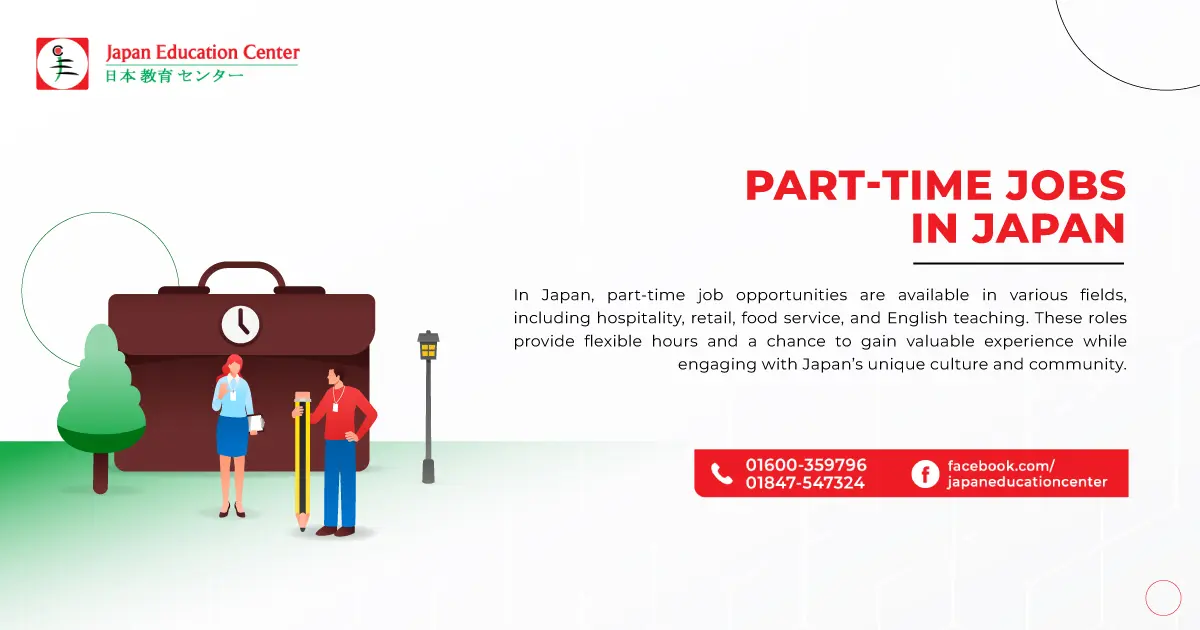Finding a job that fits your life and schedule can be tough, even in a new country. That’s why we’re here to help you find part time jobs in Japan. These jobs offer flexibility and independence, making them ideal for students looking to get a part-time job. About 67% of international students in Japan work part time, showing high demand.
At the Japan Education Center, we aim to help you find the right part-time job in Japan for students. This job should match your needs and goals.
Imagine balancing work and personal life, free to follow your passions. Part time jobs in Japan offer this chance. You can work in a convenience store or as an English tutor. In Tokyo, part-time jobs for foreigners can pay around ¥1.1K per hour, allowing you to earn while living in Japan and improving your Japanese.
We’re excited to help you find your perfect part time work in Japan. Let’s start this journey together and explore the various jobs that are available in Japan!
Understanding the Japanese Part Time Job Market
The Japanese part-time job market is changing fast. More companies now offer flexible work options, making it easier to find jobs for foreigners in Japan. The number of part-time workers in Japan has grown from 11.5% in 1980 to about 21% in 2020.
This trend is expected to keep growing. Japan’s working-age population is set to drop by over 10% in the next 20 years. This decline is driving the need for more part-time jobs.
Part-time jobs are becoming more common and accepted in Japan. Many young people prefer jobs that offer a good work-life balance. This shift is helping to increase the number of part-time job openings.
Current Trends in Japanese Employment
Some key trends in the Japanese part-time job market include:
- Initiatives like equal pay for equal work, regardless of full-time or part-time status, are being pushed as government policies.
- Technological disruption from digitization and AI automation will displace many routine jobs, necessitating flexible work arrangements.
- Part-time workers usually get fewer paid vacation/sick days compared to full-time employees.
Part-Time vs Full-Time Work Culture
In Japan, full-time employees often stay with the same company for life. But part time workers have fewer legal protections. Despite this, the Japanese part-time job market is growing.
Many companies are now looking to hire part time workers. This is because of the declining workforce in Japan.
Popular Part-Time Jobs in Japan for Foreign Workers
Finding a part time job in Japan can be tough, but it’s easier for foreigners with the right help. At the Japan Education Center, we assist foreign workers in finding jobs that fit their skills and interests. Many part-time jobs are available, such as teaching English, working in hospitality, and freelance writing.
Some popular part-time jobs in Japan for foreigners include:
- Teaching English: Many language schools in Japan hire foreign teachers to teach English to students of all ages.
- Hospitality: Hotels, restaurants, and bars often hire foreign staff to work part-time, especially during peak travel seasons.
- Freelance writing: With the rise of online content, many companies in Japan are looking for freelance writers with strong Japanese language skills to create engaging content for their websites and social media channels.
The average monthly salary for a hotel receptionist in Japan is between 172,000 to 220,000 yen. Hourly wages for sales positions at department stores can range from 1,700 to 2,000 yen for Chinese-Japanese speakers. We also found that monthly earnings for building cleaners and general workers in building maintenance can vary from 215,000 to 230,000 yen and 250,000 to 350,000 yen, respectively, depending on the type of job.
These jobs offer a great way to experience Japanese culture while earning a steady income. We recommend checking out job listings on websites like Jobs in Japan. It offers a wide range of part-time jobs in various industries, including education, hospitality, and information technology.
| Job Title | Monthly Salary (yen) | Hourly Wage (yen) |
|---|---|---|
| Hotel Receptionist | 172,000 – 220,000 | |
| Sales Position | 1,700 – 2,000 | |
| Building Cleaner | 215,000 – 230,000 | |
| General Worker | 250,000 – 350,000 |
Requirements for Working Part-Time in Japan
To work part-time in Japan, you need to meet some requirements. We’ll cover how to get a Japan part-time work visa and what’s needed for part-time jobs. Foreign workers must get a visa and show they can speak the Japanese language well.
International students in Japan can only work 28 hours a week during school. To work part-time, students need a special document. This document lets them do activities not allowed by their visa.
Visa Requirements
A Japanese part-time work visa is needed for foreign workers. To apply, you must submit your passport and proof you can speak Japanese.
Language Proficiency Expectations
Speaking Japanese well is key for part time work in Japan. Workers need to show they can communicate effectively in Japanese.
Documentation Needed
You’ll need a valid passport, visa, and special permission to work part-time in Japan. Make sure all your documents are correct before starting a job.
Knowing the rules for part-time work in Japan helps foreign workers. We give details on visa needs and language skills. This info helps people make smart choices about their careers.
Salary Expectations and Working Hours
When looking at part time work in Japan, knowing the salary and hours is key. Salaries vary by industry, location, and experience. On average, part-time jobs pay well, with hourly rates from ¥800 to ¥1,200. This means a monthly income of ¥64,000 to ¥96,000, based on typical hours.
International students in Japan can make ¥80,000 to ¥120,000 monthly, working 28 hours a week. The minimum wage is ¥1,004 an hour, with Tokyo paying more. Jobs like English tutoring, IT support, and healthcare can pay up to ¥300,000 monthly.
- English tutoring: ¥200,000 – ¥300,000 per month
- IT support roles: ¥230,000 – ¥280,000 per month
- Healthcare jobs: ¥250,000 – ¥350,000 per month
Part time work in Japan offers good pay and flexible hours. This makes them appealing to international students and workers. Knowing what to expect helps in choosing the right part time work in Japan.
Finding the Best Part-Time Jobs Through Japan Education Center
Looking for the best part-time jobs in Japan can be tough, even for foreign workers. The Japan Education Center helps by providing job search tools and application support. We aim to boost your chances of landing the
At the Japan Education Center, we offer many resources to help you find part time jobs. These include:
- Job search databases with a wide range of part-time job listings
- Resume building and interview preparation assistance
- Career counseling to help you find the best part-time job for your skills and interests
Our data shows that many foreign students in Japan can work 28 hours a week with a work permit. Some jobs, like babysitting, can pay over 10,000 yen per hour. Popular jobs for students include English teaching, working at conveyor belt sushi places, and babysitting. We can guide you to these and more through our job search and application support for foreigners in Japan.
Our career counseling can offer the support you need to succeed in Japan’s job market, especially for jobs that require a certain level of Japanese. We help with resume building, interview prep, and navigating the job market. With our help, you can find a part-time job in Japan that meets your needs and goals.
| Part-time Job | Hourly Wage | Work Hours |
|---|---|---|
| English Teacher | 2,000 – 3,000 yen | 20 – 28 hours/week |
| Conveyor Belt Sushi Employee | 1,500 – 2,500 yen | 20 – 28 hours/week |
| Babysitter | 1,000 – 2,000 yen | 10 – 20 hours/week |
Cultural Etiquette in Japanese Workplaces
Starting a new job in Japan can be tough, thanks to its unique workplace culture. At the Japan Education Center, we offer tips on cultural etiquette to help you do well in your part-time job. Knowing how to act in a Japanese workplace is key. It helps you get along with your coworkers and bosses.
In Japan, respect for hierarchy, group harmony, and detail matter a lot. Your actions and body language are very important. For instance, bowing is a big part of saying hello in Japan. The bow’s depth and length show respect based on the situation and who you’re greeting.
Here are some tips for handling cultural etiquette in Japan:
- Learn about Japanese customs and traditions to better understand the workplace culture
- Be respectful of hierarchy and authority figures
- Pay attention to nonverbal cues, such as body language and tone of voice
- Be punctual and respectful of meeting times and deadlines
By following these tips and being open to learning about Japanese workplace culture, you can build strong relationships with your colleagues and succeed in your part-time job. Remember, cultural etiquette in Japan is all about respect, harmony, and attention to detail.
Top Industries Hiring Part-Time Workers
We’ve found the top industries in Japan that hire part-time workers. These include retail and service, education, and hospitality and tourism. Each offers different part-time jobs like sales, teaching, and tourism work.
The retail and service sector is a big employer of part-time workers. Many Japanese companies need staff for stores, restaurants, and hotels. The education sector also has lots of part-time jobs, mainly for those with teaching skills.
The hospitality and tourism sector is another big employer. Hotels, restaurants, and tour operators often hire part-time. These types of part-time jobs can help you learn new skills and might lead to full-time work if you want to work in Japan.
Here is a table summarizing the top industries hiring part-time workers in Japan:
| Industry | Percentage of Part-Time Workers |
|---|---|
| Retail and Service Sector | 16.2% |
| Education and Teaching | 13.1% |
| Hospitality and Tourism | 11.5% |
These industries have many job opportunities for part-time. They’re great for gaining experience and skills in Japan. Whether you’re looking for a job to support your studies or to get industry experience, there are many options.
Application Process for Part-Time Jobs in Japan
Applying for part-time jobs in Japan can be tough, even for foreigners. You’ll need to send in a resume and cover letter, then go to an interview. A well-made resume, or rirekisho, is key. It should follow a certain format and you’ll need some Japanese skills.
Here are some important steps for applying to part time work in Japan:
- Look for jobs that fit your skills and interests
- Make a Japanese-style resume and cover letter
- Send in your application and wait for a reply
- Get ready for an interview, which might be in Japanese
About 75% of newcomers and students find it easy to get part time work in Japan. This is more common in big cities like Tokyo, Osaka, and Yokohama. Student visa holders can work up to 28 hours a week. It’s important to follow the rules to avoid problems with the Japanese government.
By following these steps and tips, you can boost your chances of getting a job in Japan. Remember, your studies in Japan should always come first. Japan believes students should work to cover daily costs, not to make money or send it back home.
Legal Rights and Benefits for Part-Time Workers
Knowing your rights and benefits as a part-time worker in Japan is key. The Japan Education Center offers info on these rights, which are crucial for anyone who arrives in Japan. Part-time workers in Japan have rights like working hour rules, health insurance, and laws protecting employees.
Being a part-time worker in Japan comes with benefits. Here are some:
- Standard working hours of 40 hours per week, with 44 hours per week allowed in some businesses
- Overtime pay rates, including a 25% increase in wages for work beyond statutory working hours
- Minimum wage rates vary by prefecture, such as ¥1,072 in Tokyo and ¥1,071 in Kanagawa
- Health insurance covering up to 60% of medical costs and maternity benefits equivalent to 60% of standard monthly remuneration
It’s vital to know about Japan part-time worker benefits and how they relate to life in Japan. This ensures you get fair treatment and pay. Stay updated on the latest laws and regulations for part-time work in Japan, especially for jobs in Tokyo.
Knowing your rights and benefits makes your work life more secure. Always look out for your well-being. If you have concerns, don’t hesitate to seek help.
| Benefit | Description |
|---|---|
| Working Hour Regulations | Standard working hours of 40 hours per week, with 44 hours per week allowed in some businesses |
| Healthcare and Insurance | Health insurance covering up to 60% of medical costs and maternity benefits equivalent to 60% of standard monthly remuneration |
| Employee Protection Laws | Laws prohibiting unreasonable disparity between regular and non-regular employees and requiring fair treatment for all workers |
Common Challenges and How to Overcome Them
Working in Japan can be tough, even for locals. For newcomers, part-time job challenges like language barriers and cultural differences are huge hurdles. Job insecurity in Japan can also harm your mental health and overall happiness.
Some common challenges faced by part-time workers in Japan include:
- Language barriers: Japanese is very hard for most foreigners to learn, making it tough to communicate.
- Cultural differences: Japan’s mostly Japanese culture can make newcomers feel stared at, exoticized, and left out.
- Job insecurity: Japan’s shift away from lifetime jobs makes it hard for part-time workers to find stable jobs.
To beat these challenges, being ready and adaptable is key. Making friends at work can make your job better and your work life happier. Also, learning Japanese and about Japanese culture helps students fit in better.
Knowing the common problems and how to solve them can make working in Japan rewarding. We offer tips and resources to help part-time workers succeed in Japan’s job market, including job boards for finding jobs available.
Tips for Success in Your Japanese Part-Time Career
To succeed in a part time work in Japan, you need a balanced approach. The Japan Education Center offers tips for a successful part-time career in Japan.
Building Professional Relationships
Building good relationships at work is key. Be polite, courteous, and respectful to your colleagues and bosses.
Time Management Strategies
Managing your time well is essential. Prioritize tasks and use your time wisely. This helps you balance work and personal life better.
Career Growth Opportunities
There are chances for career growth if you’re willing to learn and adapt. Use career tips and keep improving your skills. This boosts your chances of success in Japan.
Here are some important tips for success in Japan:
- Be flexible and adaptable
- Keep improving your skills and knowledge
- Build strong professional relationships
- Manage your time well
Conclusion
The part-time job market in Japan is full of chances for those who want flexible work. You can find jobs in retail, service, education, and hospitality. Knowing about visas, culture, and legal rights helps foreign workers succeed.
Part-time jobs in Japan can help you earn extra money, gain experience, or dive into the Japanese work culture. With the right attitude, preparation, and help from places like the Japan Education Center, you can find a fulfilling part-time job. So, start looking, explore, and begin your exciting career in Japan.



